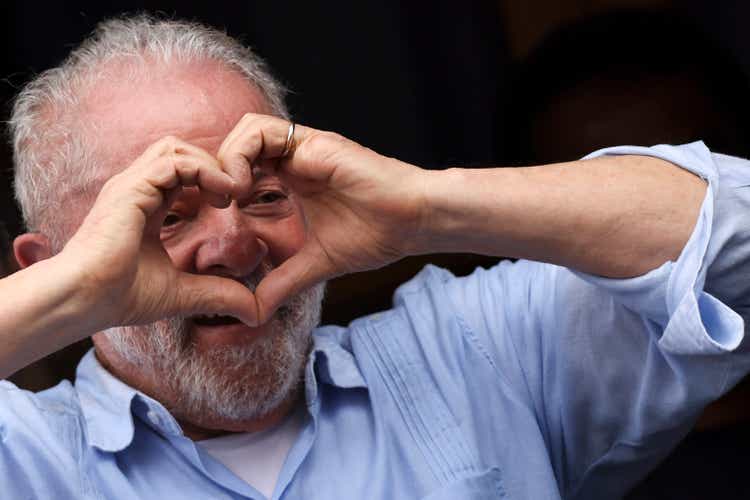Eye on commodities: Lula wins presidential runoff in Brazil
Oct. 31, 2022 4:28 AM ET
iShares MSCI Brazil Capped ETF (EWZ), BRF, BRZU, EWZS, BZQ, UBR, FBZ PBR
By: Yoel Minkoff, SA News Editor 14 Comments
 Buda Mendes/Getty Images News Buda Mendes/Getty Images News
Brazil's Supreme Electoral Court has declared leftist Luiz Inácio Lula da Silva as the next president of the country, with 50.9% of Sunday's vote going to the longtime leftist leader, compared to 49.1% for right-wing incumbent Jair Bolsonaro. It was somewhat of a predictable but close outcome, with Lula winning the first round of an election over a month ago, banking on a return to greater social spending due to rampant inflation. On the campaign trail, Lula also positioned himself as a pro-democracy candidate by promising to rebuild ties with government institutions, while ending rising levels of poverty and attracting foreign investors to re-industrialize the economy.
Backdrop: In Lula's first term starting in 2003, Brazil's economy grew rapidly, mostly due to a lucrative trade partnership with China. The new cash flow was used to finance a new social welfare program called Bolsa Familia intended to help millions escape the cycle of poverty, while other reforms were passed, like increasing the minimum wage. By the end of his second term, Brazil's GDP was the highest in its history and Lula's approval rating soared to 83%.
Fellow Workers' Party member Dilma Rousseff was picked as a successor in 2009, but she never proved to be as popular as Lula. Early in her administration, global demand for commodities dropped off their peaks, resulting in a recession in Brazil and criticism over how she managed the economy. She also faced corruption accusations known as "Operation Car Wash," which ultimately cost Rousseff her job and sent Lula to jail, and prohibited the latter from participating in the 2018 election that vaulted retired military officer Bolsonaro to power.
A new "pink tide"? The political shift first described a move towards left-leaning governments in the late 1990s and early 2000s, which were bolstered by the commodities supercycle of the era. It even led Brazil to be included in the group collectively known as BRIC nations, which emerging market investors saw as attractive due to their sources of raw materials and growth expectations. In recent years, a commodities supercycle has been making a comeback in the aftermath of the pandemic, and has already witnessed landmark leftist victories in Peru, Honduras, Chile and Colombia.
ETFs: NYSEARCA: EWZ, NYSEARCA: BRF, NYSEARCA: BRZU, NASDAQ: EWZS, NYSEARCA: BZQ, NYSEARCA: UBR, NASDAQ: FBZ |





 Buda Mendes/Getty Images News
Buda Mendes/Getty Images News